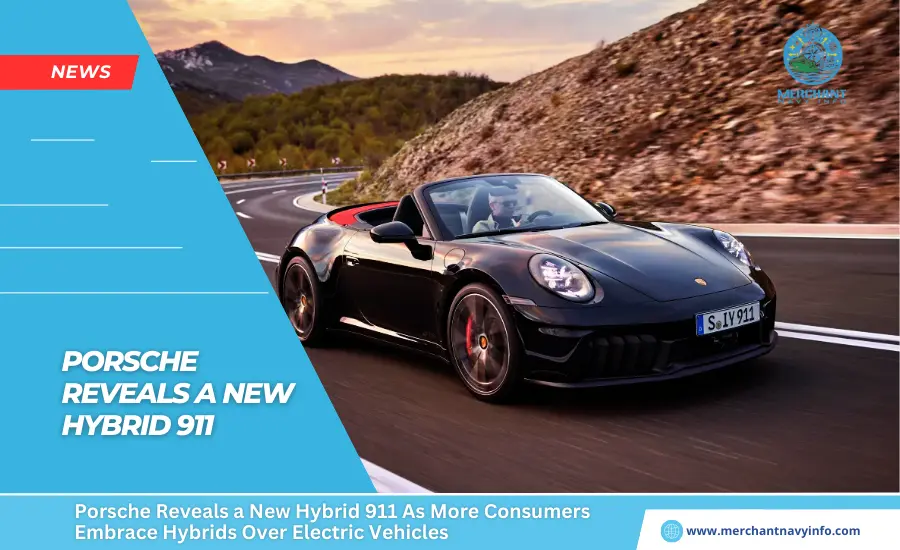
On Tuesday, Porsche unveiled the first hybrid version of its most famous sports car, the 911. This move could help electric motors become more accepted even in performance cars.
The move also marks a major step in the evolution of one of the most recognizable cars in the world. Given their generally greater fuel efficiency without sacrificing power, hybrids have become commonplace in many vehicles. They have become increasingly popular in the United States even as sales of purely electric models have started to slow.
The Unique Hybrid Approach for the 911
The German automaker Porsche, a division of Volkswagen AG, already sells plug-in hybrid models like the Cayenne e-Hybrid SUV and Panamera e-Hybrid four-door car, but a hybrid 911 is another matter.
Initially, hybrid power will be available in only one car version, the high-performance 911 Carrera GTS. With an electric motor integrated into the car’s eight-speed transmission assisting the car’s six-cylinder gas engine, the new 911 model will produce up to 532 horsepower. This speed is 59 more than the current Carrera GTS model.
Few cars are as defined by a gasoline engine as the 911, and few automakers are as defined by one model as Porsche is by the 911. While Porsche sells far more SUVs than sports cars, the 911 remains the automaker’s core model. Even the Porsche Macan and Cayenne SUVs, with their rounded edges and sloped hoods, have nods in their designs to the 911.
In another major change for Porsche, this car will not be a plug-in hybrid, as other Porsche hybrid models have been. The Porsche Cayenne e-Hybrid and Panamera e-Hybrid are plug-in hybrids with batteries that can be charged from an EV charger and the vehicle’s engine. Those models can also drive some distance on only electric power after the battery has been fully charged. The 911 Carrera GTS will be a fully self-contained hybrid, charged only by engine and braking power. It will not be able to drive significant distances on electric power alone.
Why Hybrid?
Besides hybrids, Porsche sells fully electric cars like the Taycan and the new Macan Electric SUV. However, executives have said the 911 would be the last Porsche to become all-electric because its engineering is unique and quintessential to its brand. By taking away the engine in the back, which gave the car the distinctive shape and rear-weighted driving feel, what makes it a 911? This new hybrid model, which still has its gas engine mounted in the back, will be the closest Porsche can get to an electric 911 without raising those questions.
Although electric vehicle sales in the US continue to rise, the growth rate has slowed sharply in recent months, while sales of hybrids are growing faster. The slowing of EV sales has been blamed on the relatively high prices of the models currently for sale and a lack of reliable public EV chargers. Hybrids are generally cheaper and don’t require a charger.
This particular hybrid will be costly, though. The 2025 Porsche 911 Carrera GTS prices will start at around $165,000.
A Porsche test driver drove the hybrid around Germany’s famed Nürburgring Nordschleife racetrack in 7 minutes and 17 seconds — 8.7 seconds faster than a comparable current-generation 911 Cara GTS. The Nürburgring is a twisty and challenging track. So, the faster time also indicates that the added weight of batteries and electric motors doesn’t hinder the car’s handling.
A Legacy of Design Shapes the New Hybrid 911
The unveiling of the new hybrid version comes about 60 years after Porsche launched the 911. The first 911 was unveiled in 1963 but didn’t go into production until 1964. It was a more powerful addition to Porsche’s original model — the 356.
Both models, produced together for a few years, had small back seats and engines mounted behind the rear wheels. The layout was similar to the Volkswagen Beetle. It was a car designed by Ferdinand Porsche Sr., the father of Ferdinand “Ferry” Porsche, who created the 356. Ferry’s son, Ferdinand “Butzi” Porsche, worked on the design of the 911, modelled after the 356’s teardrop shape. Its form, including the increasingly cramped back seats, has remained unchanged since the original model.









